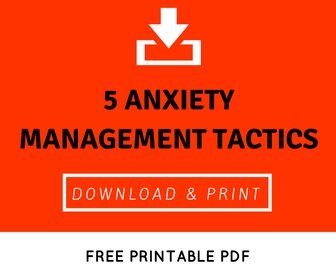Recently, a reporter asked me the following questions for an article she was writing. I thought I’d give you a sneak peak into my take on anxiety and what you can do about it.
What does anxiety mean? What happens to our body when we experience it?
The Merriam-Webster dictionary defines anxiety as:
"An abnormal and overwhelming sense of apprehension and fear often marked by physiological signs (as sweating, tension, and increased pulse), by doubt concerning the reality and nature of the threat, and by self-doubt about one's capacity to cope with it”.
This physiological response is often known as ‘fight or flight’, and it serves a very valuable purpose. If you think about it, back when our caveman ancestors had real and looming threats – like the saber-toothed tiger – around every corner, it was imperative they had a physiological reaction that operated like clockwork to get them out of danger.
However, in modern days we do not have the same threats as we did in caveman days. When we do, our fight or flight mechanism can often save our lives. Yet, oftentimes the threat we’re anxious about isn’t even real, but instead made up in a persons’ mind.
When I work with my clients, I refer to these future concerns, doubts, and fears as the ‘What ifs”: What if I fail? What if I can’t do it and everyone finds out? What if I embarrass myself? What if I get fired? What if, what if, what if . . it can go on forever and ever. And when you’re focused on your what ifs, you are actually distracted from reality. You start to think that these ‘what ifs’ are real: it’s like whatever future concern or fear you’re thinking about is happening to you right now. So you succumb to your concerns, doubts and fears in the same way that if there was actually a saber-toothed tiger in front of you. It feels the same, the same fight or flight mechanism is triggered in your body, and your anxiety rises (often exponentially).
But there is no saber-toothed tiger, the threat isn’t actually present, so the question becomes: How can we calm ourselves down when an anxiety attack hits (and it can feasibly hit multiple times per day in a normal person, especially if you’re concerned about something you deeply care about)?
What kind of situations lead us to anxiety?
Any situation can lead to anxiety, from not remembering to purchase that one ingredient that’s needed to make your grandmother’s famous soufflé only hours before 40 people are expected to descend upon your house to a big presentation that’s weeks away. It is not so much the situation that causes the anxiety, but rather our mindframe about the situation. In other words, the same situation could cause anxiety in one person and not another or might cause anxiety for you at one moment and not another – it’s all about how you think about it.
One thing I discovered when writing my thesis on the experience of anxiety in beach volleyball athletes at the 2012 Olympics was that those athletes who were less prepared experienced higher levels of anxiety. To go back to caveman-times for a moment: If you were standing there with a saber-toothed tiger in front of you, it is obvious that you would feel much more anxious if you were there on your own, without any weapons and without a plan than if you had a group of cave-people surrounding the tiger, with a tiger-trap rigged up, and with bows and arrows ready to fire. Preparation is key in dealing with anxiety.
Similarly, when something unexpected happens, your experience of anxiety is usually at it’s peak, again because there has been no opportunity to adequately prepare to deal with the situation.
Does technology play a role on that issue?
I think that technology can lead to anxiety depending on the users’ relationship with technology. Due to modern technology, in their waking hours the users can have the experience of always being ‘on’ and connected – to work, to family, to the world. When constantly connected to technology it is more challenging to be connected to yourself because the feedback is external in nature. As a result, it is imperative that you spend even a little time away from technology each day to recharge your batteries. The best way I know to do so is by adopting a mindfulness meditation practice. Doing so is simple, but not easy: it’s simple because all it requires is for you to to take 5-15 minutes a various intervals throughout the day, close your eyes, disconnect from the world, disengage from your thoughts and focus inward into nothing while breathing deeply. And, it’s not easy because you’re used to your thoughts and other messages bombarding us constantly throughout the day.
Try spending even 10 seconds without getting distracted by your thoughts of what you have to do. You’ll see how this simple task can be very difficult!
When is feeling anxious good for your health?
Anxiety is very important for us as human beings. It is part of the mechanism that keeps us safe. We need anxiety, it’s part of our genetic make-up, and it’s not going to go away anytime soon (nor would we want it to). In fact, in my thesis interview with 3x Olympian Kerri Walsh, she said she’s always anxious! The trick is to accept that it is there and to identify times when you feel most anxious, then create a plan to deal with that. In fact, I often tell my athletes that butterflies and nervousness is a good thing, because it shows them that they care about their pursuit. When anxiety is good for your health is when you use it as a signal (kind of like a traffic signal) to cue you to how you are feeling, or to what might be awry in your surroundings. So long as you don’t judge yourself or the anxiety experience, you’re ahead of the game and then you can go about dismantling any unnecessary anxiety feelings and otherwise enjoy the ride. The fact that you’re anxious means that you’re ALIVE!

What are five tactics to control anxiety?
1. Accept the Anxiety – Accept that you’re going to be anxious. That butterflies are part of human existence. That anxiety serves a valuable role in keep you safe and on your toes. In fact, when I interviewed her for my thesis, 3x Olympic Gold Medalist Kerri Walsh said she’s always anxious and that one of her tricks has been to accept that and to name her butterflies ‘Victory’.
2. Identify Your ‘What Ifs’ – Unless there’s a real threat right in front of you, most anxiety symptoms are caused by your thoughts about what might happen in the future. The trick is to take 5 minutes to identify all of your possible ‘What ifs’ so that at least you are aware of what you’re concerned about so you can do something about it. Make sure to write down all of your what ifs, even the silly ones.
3. Get Prepared – Using your ‘What Ifs’ as a guide, create a plan of action for each of those what ifs, so if they do arise, you will be prepared to deal with them. Create a plan for every eventuality you can think of, and you’ll notice your anxiety subside. Even if you are faced with a situation you had not prepared for, all of your preparation will help you to be cool-headed in the moment.
4. Take a Breath – Anxiety happens when your mind races to future thoughts of what might or might not happen. There is no anxiety in the present moment, all there is is action and/or reaction. Mindfulness training is a great way to get connected to the present moment To get focused in on the resent, ask yourself: What’s one thing I have to do every moment or else I’ll day? Yes, you have to breath. So the trick to getting back present is to focus completely on your breath. Take three deep breathes in and out, pausing for three seconds at the top and bottom of each breath. Feel every molecule of air filling all your cells and organs, and feel all your concerns, doubts, fears, and negativity exiting your body with your out-breath. Not only will your heart rate decrease (also minimizing your anxiety symptoms) but your logical mind will return, able to deal with the situation at hand.
5. Train your Brain – Mental Training is no different than physical training in that the repetition of desired skills leads to the results that you want. In the case of anxiety, mental training can support you in developing new brain patterns that help you to early identify your anxiety symptoms and cut them off before the get a hold of you. Mental Training will also support you in developing proficiency in using tools to support minimizing anxiety symptoms when they strike. We have a Mental Training App called ‘Get Psyched App’ available for free on the Apple App Store that has specific tools (including visualization and mindfulness training) to help you train your brain as well as many other mental training articles on our website.
GET THESE 5 TACTICS IN A FREE PRINTABLE PDF:
CLICK HERE





